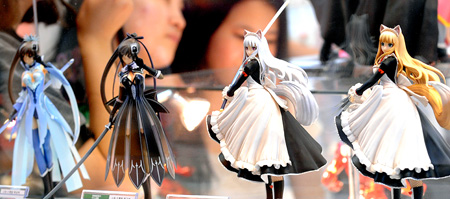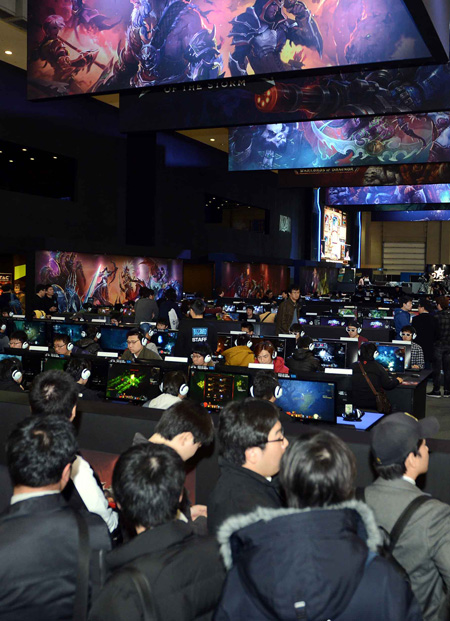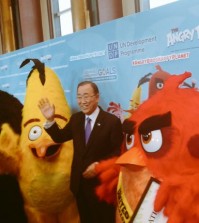- California Assembly OKs highest minimum wage in nation
- S. Korea unveils first graphic cigarette warnings
- US joins with South Korea, Japan in bid to deter North Korea
- LPGA golfer Chun In-gee finally back in action
- S. Korea won’t be top seed in final World Cup qualification round
- US men’s soccer misses 2nd straight Olympics
- US back on track in qualifying with 4-0 win over Guatemala
- High-intensity workout injuries spawn cottage industry
- CDC expands range of Zika mosquitoes into parts of Northeast
- Who knew? ‘The Walking Dead’ is helping families connect
Pushing the restart button
After drama-filled 2013, Games industry enters New Year with mix of hope, apprehension

Visitors look at the figurines of video game characters at the Seoul International Cartoon and Animation Festival at COEX, southern Seoul, last year. (Korea Times)
By Baek Byung-yeul
For Korea’s game industry, 2013 couldn’t end fast enough. Anticipation for the New Year, however, is also mixed with hope and fear as policymakers continue to be caught between promoting gaming and restricting its use.
If it wasn’t for politicians debating stricter controls on gaming hours, last year might have been marked as a win for the gaming industry. The Korea Creative Contents Agency (KOCCA) said that the market grew by nearly 10 percent year-on-year in 2013. The domestic demand continues to be robust and exports rose by 11 percent to $29 million, accounting for 60 percent of all Korean cultural exports.
While Korea’s major gaming product continues to be online games played on computer servers, the market for games played on mobile devices like smartphones and touch-screen tablets increased by 50 percent over the past 12 months, the state-run organization said.
But game companies are concerned about the possibility of slower growth as President Park Geun-hye’s political party continues its push for tight controls on gaming habits.

Game fans play newly-released online games at the G-Star game industry fair in BEXCO, Busan, in November last year. The event lost some of its luster after Korean companies refused to participate in protest of the political efforts to strengthen restrictions on gaming habits. (Korea Times)
The Saenuri Party has an enforcer in Shin Eun-jin, a doctor-turned-lawmaker who argues that games are as pathologically addictive as alcohol, drugs and gambling. She groups these behaviors as the main targets for her proposed National Addiction Control Committee, which she recommends as a unit of the Prime Minister’s Office, but which acts as a lobby.
While Shin’s proposal was met with resistance from opposition lawmakers and game industry people, the Saenuri Party vows to continue the debate on tougher rules in 2014. Shin does appear to have the support of Korea’s famously overzealous parents, many of who seem to want their kids to put the mouse down and download English words to their brains 24/7. The Ministry of Health and Welfare is currently preparing a public hearing on the issue, although the date has yet to be announced.
“If game addiction really exists, the root of the issue belongs to parents, not their children. Let’s stop talking about unproved links about games and violent behavior,” said Chin Jung-kwon, a culture critic and Dongyang University professor.
“Parents need to think about why their kids became so obsessed with games in the first place. In the extremely hierarchical educational system, games are one of the very few outlets they have.”
The law already prevents gamers under the age of 16 from playing between midnight and 6 a.m., but youngsters seem to find it easy to bypass the restraints.
Growth in mobile games
If the government is failing to employ effective controls on games played on computers, it remains to be seen whether it has a chance for the increasing number of gamers playing on their phones.
Since “Angry Birds” ignited a mobile game craze years ago, several Korean firms have been attempting to exploit the rapidly growing market. The combined revenue of Korean mobile games was measured at 1.2 trillion won in 2013, compared to the 7.3 trillion won in sales posted by online games.
“Anipang Puzzle,” a casual color-matching game, was truly an epidemic and inspired me-too products from game companies such as CJ E&M, Netmarble and even NCsoft, which has specialized in role-playing games such as Lineage.
“The top companies in the industry are involved, so there will be a lot more mobile game titles for users to choose from this year,” said Hyun Nam-il, a game industry observer and columnist.
In the world of online games, “League of Legends (LOL)” continues to be king. The product of the American game company Riot Games has proved to be an immense hit with Korean gamers, whose love for war strategy games was first developed by Blizzard’s StarCraft.
LOL has been the most played game at Korea’s “PC bangs,” or computer gaming lounges, for 75 straight weeks and counting, according to industry data.
It remains to be seen whether LOL will be able to sustain an e-sports boom like StarCraft once did. There are plans to hold the first LOL world championships in Yongsan, Seoul, during this year, aimed at bringing together the world’s top gamers for prize money.
Nexon, Korea’s largest games company and local publisher of football game FIFA Online 3, is hoping that the real-life World Cup finals played in Brazil will boost its product. NHN Entertainment is also planning to publish its new football game, “Winning Eleven Online 2014,” during the first-half of the year.













Western Games
April 15, 2017 at 1:54 PM
mobile games growth tremendously. Mobile games are best. Its actually a big gaming zone in your pocket.